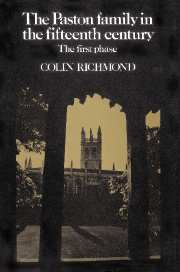Book contents
- Frontmatter
- Contents
- List of genealogical tables
- Preface
- Acknowledgements
- List of abbreviations
- Chronological table
- 1 The origins of the Pastons
- 2 Land: acquisition and defence
- 3 East Beckham
- 4 Three marriages
- 5 Relations: the Garneys and the Berneys
- 6 The deathbed of William Paston and its consequences
- 7 Sir John Fastolf and John Paston
- Conclusion
- Index
1 - The origins of the Pastons
Published online by Cambridge University Press: 26 December 2009
- Frontmatter
- Contents
- List of genealogical tables
- Preface
- Acknowledgements
- List of abbreviations
- Chronological table
- 1 The origins of the Pastons
- 2 Land: acquisition and defence
- 3 East Beckham
- 4 Three marriages
- 5 Relations: the Garneys and the Berneys
- 6 The deathbed of William Paston and its consequences
- 7 Sir John Fastolf and John Paston
- Conclusion
- Index
Summary
Sheltering from a summer storm in the porch of Gresham church on an August afternoon in 1985 – about a quarter of a mile up the hill from the moated platform of the Paston house, an oasis of shrubbery among the corn, and a couple of miles from deserted East Beckham – I shared the quiet and isolation with a Latin inscription, all that remained of a fifteenth-century memorial, which lay just over the threshold of the church itself: pray for the soul of James Catt ‘generosus’.
It was a vivid hour. And James Catt's gentility (it seemed to me, proudly stated) brought vividly to mind what I am tempted to alliterate as the Pastons' predicament. Michael Sayer has written of late medieval–early modern Norfolk that its parishes ‘often contained several little manors, and a parish of under 2,000 acres might support several gentle and yeoman households, by no means all manorial lords’. Not being a manorial lord, particularly at Paston, was one part of Judge William's predicament; the other part was that until he was a manorial lord, and at Paston, the family, however grand he was, however many manors he bought or bargained for, might remain among that rank of gentlemen of which Michael Sayer speaks and of whom James Catt at Gresham is, or was for me that afternoon, representative. North Erpingham Hundred in 1985 still made the point; the people may have gone from the fields to leave a deserted, industrialized landscape, but the pattern of parishes and parish churches survives.
- Type
- Chapter
- Information
- The Paston Family in the Fifteenth Century , pp. 1 - 22Publisher: Cambridge University PressPrint publication year: 1990



